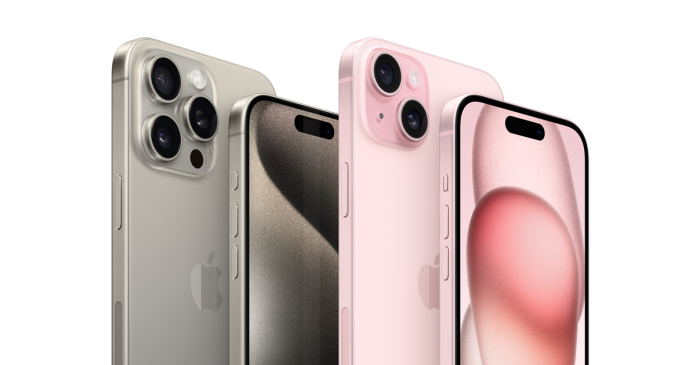Apple has overtaken Samsung to take top spot in the global smartphone market, the last time a company not named Samsung was at the top of the smartphone market was 2010.
Though the data is preliminary, this is sort of shifting of power at the top of the largest consumer electronics market was driven by an all-time high market share for Apple and a first time at the top. Overall, the global smartphone market remains challenged, but momentum is moving quickly toward recovery.
According to data from the International Data Corporation (IDC) Worldwide Quarterly Mobile Phone Tracker, global smartphone shipments declined 3.2% year over year to 1.17 billion units in 2023. While this marks the lowest full-year volume in a decade, driven largely by macroeconomic challenges and elevated inventory early in the year, growth in the second half of the year has cemented the expected recovery for 2024. The fourth quarter (4Q23) saw 8.5% year-over-year growth and 326.1 million shipments, higher than the forecast of 7.3% growth.
“While we saw some strong growth from low-end Android players like Transsion and Xiaomi in the second half of 2023, stemming from rapid growth in emerging markets, the biggest winner is clearly Apple,” said Nabila Popal, research director with IDC’s Worldwide Tracker team. “Not only is Apple the only player in the Top 3 to show positive growth annually, but also bags the number 1 spot annually for the first time ever. All this despite facing increased regulatory challenges and renewed competition from Huawei in China, its largest market. Apple’s ongoing success and resilience is in large part due to the increasing trend of premium devices, which now represent over 20% of the market, fueled by aggressive trade-in offers and interest-free financing plans.”
“The overall shift in ranking at the top of the market further highlights the intensity of competition within the smartphone market,” said Ryan Reith, group vice president with IDC’s Worldwide Mobility and Consumer Device Trackers. “Apple certainly played a part in Samsung’s drop in rank, but the overall Android space is diversifying within itself. Huawei is back and making inroads quickly within China, Brands like OnePlus, Honor, Google, and others are launching very competitive devices in the lower price range of the high end. And foldables and increased discussions around AI capabilities on the smartphone are gaining traction. Overall, the smartphone space is headed towards a very interesting time.”
| Top 5 Companies, Worldwide Smartphone Shipments, Market Share, and Year-Over-Year Growth, Q4 2023 (Preliminary results, shipments in millions of units) | |||||
| Company | 4Q23 Shipments | 4Q23 Market Share | 4Q22 Shipments | 4Q22 Market Share | 4Q23/4Q22 Growth |
| 1. Apple | 80.5 | 24.7% | 72.1 | 24.0% | 11.6% |
| 2. Samsung | 53.0 | 16.3% | 59.5 | 19.8% | -10.9% |
| 3. Xiaomi | 40.7 | 12.5% | 33.2 | 11.0% | 22.7% |
| 4. Transsion | 28.2 | 8.6% | 16.7 | 5.6% | 68.6% |
| 5. vivo | 24.1 | 7.4% | 22.9 | 7.6% | 5.1% |
| Others | 99.5 | 30.5% | 96.1 | 32.0% | 3.5% |
| TOTAL | 326.1 | 100.0% | 300.6 | 100.0% | 8.5% |
| Source: IDC Worldwide Quarterly Mobile Phone Tracker, January 15, 2024 | |||||
| Top 5 Companies, Worldwide Smartphone Shipments, Market Share, and Year-Over-Year Growth, Calendar Year 2023 (Preliminary results, shipments in millions of units) | |||||
| Company | 2023 Shipments | 2023 Market Share | 2022 Shipments | 2022 Market Share | 2023/2022 Growth |
| 1. Apple | 234.6 | 20.1% | 226.3 | 18.8% | 3.7% |
| 2. Samsung | 226.6 | 19.4% | 262.2 | 21.7% | -13.6% |
| 3. Xiaomi | 145.9 | 12.5% | 153.2 | 12.7% | -4.7% |
| 4. OPPO | 103.1 | 8.8% | 114.4 | 9.5% | -9.9% |
| 5. Transsion | 94.9 | 8.1% | 72.6 | 6.0% | 30.8% |
| Others | 361.8 | 31.0% | 377.2 | 31.3% | -4.1% |
| TOTAL | 1,166.9 | 100.0% | 1,205.9 | 100.0% | -3.2% |
| Source: IDC Worldwide Quarterly Mobile Phone Tracker, January 15, 2024 | |||||

